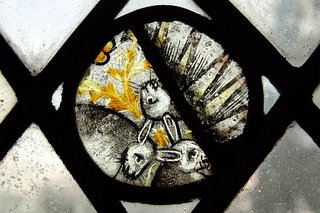 At my final lecture on the trinitarian theology of the early church, my lecturer - the playful, booming-voiced orthodox bishop, Kallistos Ware - finished by showing this picture. It was for him (and now me) one of the best images of God as trinity.
At my final lecture on the trinitarian theology of the early church, my lecturer - the playful, booming-voiced orthodox bishop, Kallistos Ware - finished by showing this picture. It was for him (and now me) one of the best images of God as trinity.On close inspection each hare shares an ear. The implication being that in the Christian tradition God is best imaged as a symbiotic community: Father, Son and Holy Spirit (or if you like more provocative but equally biblical imagery, Sallie McFague's idea of God as Mother, Lover and Friend).
If that communal image is true of God it would seem necessarily to be true of humankind 'created in God's image'. We need each other in order to be ourselves; I cannot exist - at any level, physically, emotionally, spiritually - on my own. I only discover myself in relation to an other person.
Later I discovered that this strange image had originated in Buddhist caves in China, made it's way west along the silk road appearing on Islamic coins, and finally ended up being carved on the ceilings of churches in Devon. (The amazing story of the three hares has been documented by a research trio who set up the Three Hares Project http://www.chrischapmanphotography.com/hares/ from where this image is copied).
There seemed something moving to me to find that this image has been shared by so many different faiths - an uncontested symbol. I had the three hares emboidered on my ordination stole which I now wear on those festivals of new life and fertility, Easter and weddings.
2 comments:
Welcome to blog-land. I'm amused, puzzled and intrigued by the tale of the three hares. It has some fascinating ways of comprehending the Christian way from a Buddhist perspective. I was talking to a friend who talked of the Buddhist notion of become open in all adversity, which I find a helpful description for Lent and the way of the cross.
You say the image originated with Buddhists. Do you know if it represented the three jewels? (Buddha, Dharma and Sangha). -Peter Hardy
Post a Comment